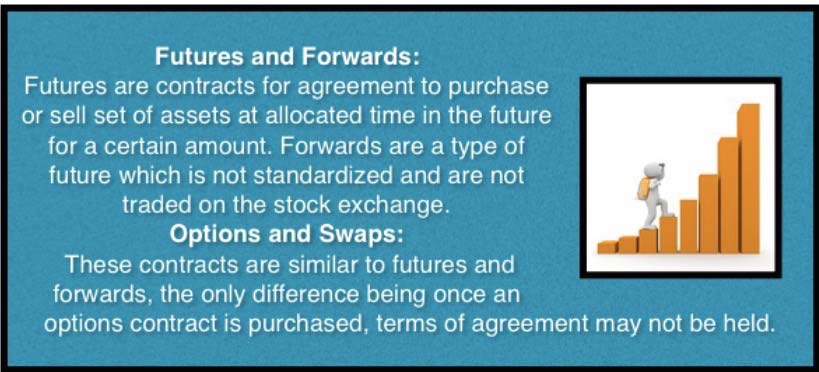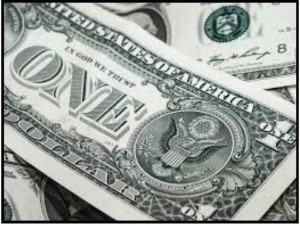Updated October 26, 2023
All About The Derivatives Market Meaning
Life has many options, but when it comes to the world of derivatives or trading futures, forwards, and options, there are certain points you need to keep in mind. Derivatives are hot property, but if you want to break the ice and get acquainted with this trading segment, you have come to the right place. Derivatives market in most countries are more popular than cash markets on an exchange. But what are derivatives? And how do you go about trading in these? Read on to know more.
Derivatives: Financial Contracts
These financial contracts derive value from an underlying asset. The underlying asset could be exchange rates, the rate of interest, currencies, commodities, indices, and stocks. When you trade in derivatives, you are betting in the present on the asset’s future value.
With this comes another important result of the derivatives market meaning trading- the value of underlying assets constantly changes, which can help investors earn profits.
What kind of changes are we looking at? A stock’s value may increase or decrease, a derivatives market trading exchange rate of currencies may fluctuate, commodity prices may rise or fall, and indices may vary. In the derivatives market, making money depends on the ability to predict the future value of the underlying asset correctly.
Derivatives Market Meaning: Four Kinds
The following details the 4 different forms of derivative contracts, including forwards, futures, swaps, and options:
Trading Tips: Decoding Derivatives
Wondering how to trade in futures, forwards, options, or swaps? Much like the cash segment of the stock exchange, the derivatives market involves certain key pointers that can open your options. Here are some key tips to remember.
1. Research Your Options
The most important point for trading in the derivatives market is doing homework. Research the different strategies of trading before stepping into the hot seat. Do note that systems need to be different from that of stock markets.
For example, if you wish to buy stocks that will rise in the future, this translates into a buy transaction in the stock market and a sale transaction in the derivatives market trading.
2. Account for the Margin Amount
Another important point to note while derivatives market trading is that you must arrange for requisite margin amounts as stock market rules necessitate the maintenance of such accounts.
The amount can only be withdrawn from the account once the trade settles. Margin amount changes as the price of underlying stocks rises or falls. Keeping extra amounts in the account is vital.
Recommended Courses
- Merger Modeling Training Course
- Training on Credit Modeling of Cipla
- Professional Credit Research of Education Sector Course
- Online Certification Course in Credit Research of the FMCG Sector
3. Ensure Your Account Allows Derivatives Trading
Conducting the transaction through the trading account is only possible if you can trade in derivatives. Once you have received permission, you can place orders with your broker or online.
4. Consider All the Angles Before You Take the Plunge
It is important to consider all the angles to get the degree of certainty needed to select the right derivative. The selection of stocks and their contracts depend on the following factors:
- Amount in Hand
- Margin Requirements
- Price of Underlying Shares
- Contract’s Price
5. The Fundamentals of Derivatives: Pre Requisites for Investing
Trading in derivatives is similar to trading in the cash segment. So, when trading in index and stock contracts, you need a deeming account, trading account, and margin maintenance.
The derivatives market uses exposure margins to reduce volatility and excessive speculation. A mandatory deposit called margin money covers an initial margin and exposure margin, which acts as a risk containment measure for exchanges and preserves the market’s integrity. The initial margin is adjusted daily based on the market value of open positions. Apart from this, a mark-to-market margin covers the daily difference between the contract and closing price on the day the purchase is made.
6. Rule Number 1: Never lose money, Rule Number 2: Don’t forget Rule Number 1
This interesting quote by the CEO of Berkshire Hatchway, Warren Buffet, points to the importance of safeguarding money from losses. Choose such awesome derivatives that anyone can run them, and as Buffet cautions, “beware of geeks bearing formulas!”. History-based models may look impressive but say nothing.
7. The 4 Most Dangerous Words in Investing- “This time, it’s different.”
Sir John Templeton, the founder of Templeton Mutual Funds, has discussed how bull markets take birth in pessimism and end in euphoria.
When the glass is half empty rather than full, it’s the best time to invest in derivatives market trading. To perform better, one also has to stand out from the crowd.
8. Markets are not always “up” or “down” entities
Markets are typically considered up or down entities with less consideration for a time frame or direction movement along periods. The operative state of the call depends upon the point of reference, which can range from long-term to intermediate and short-term. While using my periods, it is important to consider the larger time frame over the shorter one. Markets can also move laterally rather than just up and down. Defining what market time is in play can lead to the materialization of profits and maximal returns.
9. What everybody knows can turn out to be wrong
Trading adages are all very well, but independent thinking gets you accolades in the derivatives market. People quickly accept conventional wisdom because it sounds plausible. But Chairman of Roger Holdings and Beeline Interests Inc, Jim Rogers, holds that one of the basic facts of life is that things that everybody knows often turn out to be incorrect.
If bull markets climb a wall of worry, bears slide a slippery slope of hope- this is one adage every trader has heard. But applying the wisdom is what gets you closer to smart investing. The sayings are rooted in market sentiment and trader psychology. Catching the trends is as important as bucking them to get the best bang for your buck in the derivatives market trading.
10. You can go broke trading “profits”
William Eckhardt, a founder of the Eckhardt Trading company, has discussed how many traders go broke in pursuit of profits which land them large losses. Aim for smaller profits- a success rate is just a number, and performance is more than a statistic. Expectancy is a critical metric, and beginning traders should consider how much they expect to win or lose for an amount of money placed at risk.
11. Focus on how much you could lose, rather than what you will gain
Managing the derivatives market means risks and consequential losses, which are vital for a profitable trading plan. A threat is a chance you will lose money or trading capital. Risk requires us to evaluate losses, not gains. You can only win if you play the game. Finding the level which protects against large losses and guarantees gains is what efficient risk management is all about.
Consider the critical notion of a stop loss. It is a simple limit on the amount a trader is willing to risk on a single trade. Placing a stop loss can protect you from market volatility and its see-saw effects.
12. Paper trading is equal to shadow boxing
To be a good trader, you must learn how to trade rather than just standing on the sidelines and hoping you’ll make money.
13. Patience is a virtue in the Markets
Being premature in entering positions in the derivatives market is a costly mistake in every sense of the term too. It is more important to have good timing than the right idea in the markets, according to Linda Raschke, President of LBRGroup Inc.
14. Risk control is an essential ingredient of the recipe for success in derivatives markets
According to Paul Tudor Jones, founder of Tudor Investment Corporation, risk control is the essence of success in trading. You must manage risk to make profits in the derivatives market.
15. Peak performance trading is all about doing your best
Good is fine, better is finer, but the best is what counts when it comes to making profits in the markets. You can learn from mistakes and have a working business plan for trading. It is because trading is the ultimate business.
16. Automate, automate, automate
Technical analysis software has simplified computer-automated trading systems that generate signals for the trader to follow, and the trading platform is just the start. You can have portfolio management, risk management, equities, and fund management software.
17. Successful traders are more than market wizards
Winning in the markets does not have anything to do with tricks or a magic formula, according to Jack Schwager, author of the Market Wizards series. In the markets, attitudes count more than approaches.
18. Market discipline counts when it comes to making profits
A top fertilizer is the farmer’s shadow- according to Howard Abell, noted trading author, this farming adage applies equally well to the markets. Derivatives market trading is about cultivating market discipline and strict money management techniques.
19. The broker said the derivatives will move. I thought he meant up!
Just because a market can remain irrational longer than you can stay solvent, it is important to check the direction of the movement of the derivatives. Remember that which can go up can also come down, and sideways movement is possible.
Very few people can profit over time though everyone wants to win at the markets. It is because they heed the signs rather than moving with the herd, regardless of whether it is a bull market or a bear.
20. Trading options is a whole new ballgame
Options investing has a completely different set of choices for the able investor. Adding options to your portfolio can boost your profits because you can manage a portfolio of mixed investments. Managing a diverse portfolio lowers risk and increases the chances of return. You cannot trade options with a hit or miss approach.
An option is like security, similar to a stock or bond. While trading options, you can invest in calls or puts. Rings give you the right to buy an asset at a specific price within a particular period, while puts give you the freedom to sell the underlying asset.
Investors can use options to speculate as well as hedge risks. Options can be versatile as well as speculative to the degree you choose. It’s important to shorten the learning curve by constantly updating your knowledge.
21. Choose a strategy that suits you, when it comes to options trading
Apart from a single call option, you can choose a basic covered call or a buy-write strategy where you purchase assets outright and write (or sell) call options on these assets. A married put is when an investor purchases a certain asset simultaneously. When investors are bullish on an asset’s price, they buy a put option for an identical number of shares.
The simultaneous purchase of call options and sale of the same is known as a bull call spread strategy. The reverse is the bear put spread, another form of vertical spread. It is a perfect alternative to short selling. Holding on to profits is also possible through a long straddle options strategy.
A long strangle options strategy where the investor purchases call and put options with the same maturity and underlying asset at different strike prices will also give you a firm grip on the market types of derivatives. If you want to take flight, the iron condor is what you should be flocking to, whereby you can hold long and short positions in two different strangle strategies.
Choose the butterfly spread options strategy for interesting combinations of bull and bear spread strategies. If a strangle is combined with a long/short straddle, the result is an iron butterfly. It’s a good options strategy for a steely grip on the markets.
22. Don’t let the dark side of derivatives scare you
Regarding investments in some derivatives market types, Wall Street is quite well-lit, but there is a darker side. Derivatives are considered difficult to understand, risky to trade, and challenging to manage. Indeed, investors have likened it to the Wild West of the investment markets. But, the meaning of the derivatives market meaning is not lawless. There are rules and boundaries through which you can operate to make consistent profits.
Conclusion
The best part about derivatives, like equities, is that the greater the risk, the higher the rewards. So, include the derivatives market types to access market opportunities. In the derivatives market types, risk management is your friend. It has its downsides but is mostly a game-changer rather than a game spoiler, with many win-win outcomes.
Remember, the lighter the risk, the more burdensome making profits will be. The derivatives market has many sides to it…choose an angle that yields the maximum rewards and minimum losses.
Recommended Articles
Here are some articles that will help you get more details about the Derivatives Market, so just go through the link.









